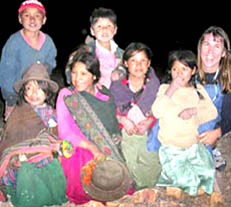The students are clamoring and the professor is holed up in his office. They want answers and he cannot hold them back for long. He gets up—what is he going to do? One expects him to open the door and let the flood in, but instead he jumps out the window. Rather than embracing the academic, he escapes to the adventure, where the questions of archaeology are answered firsthand, in the form of rolling boulders and snake-filled pits.
 |
This is a scene most of us remember from the fictional Indiana Jones movie. It is also a reminder that our theological discussions need to be more than academic exercises. They need to be a discussion based on the word of God in and out of the classroom. We need to be reminded that it was Jesus Christ who was the word incarnate.
As an international relief and development organization focusing on both spiritual and physical hungers worldwide, Food for the Hungry is often asked how we can purposefully meet these supposed conflicting goals. That we even ask questions like this in the church today is a result of centuries of Gnostic heresy regarding the separation of the physical from the spiritual. The Gnostic philosophy—the belief that Christ only appeared to be a man—was prevalent in 1st century Palestine and crept into the early church. Gnostic teaching threatened not only the reality of the incarnation of Christ, but also the authority of the atonement and bodily resurrection. John answered this false teaching in 1 John 4:2: “By this you know the Spirit of God: Every spirit that confesses that Jesus Christ has come in the flesh is from God.”
As Christians, our sanctification in Christ is worked out in our fleshly existence here on earth. There is no separation between the physical and spiritual. There is, however, the power of God displayed in our weakness. Paul explains this in 2 Corinthians 4:7-10:
“But we have this treasure in earthen vessels, so that the surpassing greatness of the power will be of God and not from ourselves; we are afflicted in every way, but not crushed; perplexed, but not despairing; persecuted, but not forsaken; struck down, but not destroyed; always carrying about in the body the dying of Jesus, so that the life of Jesus also may be manifested in our body.”
What does this mean in our evangelism efforts as Christians? It means we must jump out of the window and into the harvest. Indeed, just as Indiana Jones, we will face rolling boulders and snake pits.
Evangelism is conducted out in a world where people work, play and live. Each situation is different. There is the cranky neighbor who vocally expresses no want or need for God. There is also the sweet grandma on the corner. Each is different. There is the physically hungry and malnourished child. There is also the close friend we visit with over lunch. Each is different.
These are the questions Food for the Hungry field workers ask everyday when they approach someone like Jhoan from the Philippines. As a child, Jhoan used to think God was unfair and unjust, even cruel. She could not see how he would allow some people to be rich and yet allow her family to be very poor, lacking for basic needs such as food and water. She would often wonder how God could be good when there was no good in her circumstances. Over a period of several years, Jhoan’s heart was softened by the love and physical support of Food for the Hungry staff and the local church in her area. Now when she looks at God, she sees him as good, loving and gracious.
Evangelism is a fluid, changing process, refined as we get our hands dirty in the great adventure God has set before us. As Christians, we are called to go to the hardest places on earth, often facing the ridicule of friends and family as we reach out to areas around the world. We are commanded to always be ready to make a defense to everyone who asks us to give an account for the hope that is in us.
This will and should look differently as we bump into and come alongside our neighbors and enemies. And it happens best when we are there with them. It happens when we step outside of the church building and into the harvest. That is where Jesus Christ was when he came—and that is where he takes us.

